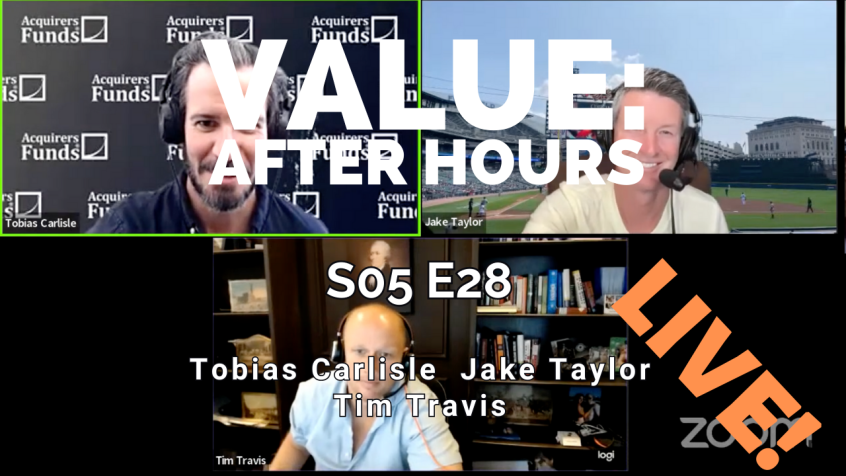During their latest episode of the VALUE: After Hours Podcast, Travis, Taylor, and Carlisle discussed Housing Crisis Phenomena. Here’s an excerpt from the episode:
Tobias: I saw a few of those. It’s like bear porn, doom porn on the housing market. They talk about the short-term rentals, the Airbnb phenomenon, that there are a lot of people who own many, many Airbnbs, and they get pretty good yields out of them because they rent them at a premium price. But this last six months, they’ve seen a big drop off in the number of people using them, which puts a lot of stress on those guys, because they’re so heavily levered and they’re running them cash flow running them for the smallest amount of cash flow possible.
Jake: I saw an interesting chart on– It was spend profile of COVID suspended student loan cohort. So, this is like people, what were they spending their money on instead when they didn’t have to make student loan payments? Most exposed in this little chart were Peloton old navy, and then let’s say like HelloFresh, the food delivery. So, it’s interesting little correlations there. I don’t know, if it means anything.
Tim: I wonder if those are the buy now pay later type companies, because yeah, the credit side, they’re not going to lose– Most originators, let’s say an ally or even someone like a one main financial that’s subprime lender, they’re not going to lose sight of the fact that there’s the moratorium in there. But some of those buy now pay later companies were more focused on loan growth and originations.
Jake: Is that a firm?
Tim: Yeah, I would look there for signs of weakness, for sure.
Tobias: Yeah, that’s interesting. I wonder to what extent that– There’s a few phenomena going on. One that you were mentioning about the new builds can sell and they can buy down the mortgage rate, which means that– Usually, there’s a big premium for a new house over an existing house in terms of price, but that premium is completely narrow, just because there’s so little supply around. There’s also been the moratorium on the evictions still hanging on since COVID moratorium on student loans. All of those things roll off somewhere around here, and so at some point, you start seeing a fair bit more supply into that market. I think that’s very negative for housing prices generally when that happens. That has a big knock-on effect to the rest of the economy.
Jake: Has there been any precedent of this before in human history where, for whatever reason, rates went up dramatically and you ended up with an ossified real estate market? Basically, you can’t move. You can’t change your rate effectively. It’s probably a very US specific phenomenon, because we have a 30-year fixed-
Tobias: Right.
Jake: -which is very anomalous in the world. So, probably not too much precedent for that, but I’d be curious to know like, what are the longer-term societal impacts of lack of mobility? Does it create a more ossified job market then, because you can’t move to take a different job in a new city as readily? I don’t know, some of the math changes a little bit.
Tobias: Then you can work from home. Work from home is another big phenomenon that’s come out of that. So, maybe you don’t have to move.
Jake: Maybe. Do you have less kids, because you can’t get a new bigger house potentially? Can you not trade down if you’re retiring and you’re empty nesting? I don’t know, I’m just trying to think through some of these second, third order.
Tim: Yeah, that’s an interesting one to think about. Yeah, because it really is hard. Even if you see a decent deal for a house, the financing costs are so prohibitive, yeah, it’s a challenge. Orange County is a big place for mortgage originations. I have a lot of friends in the business. The banks are laying people off crazy. It’s amazing how low the volumes have gotten and it’s very understandable. You’ve got the originations for the new homes. And if you’re not in that niche, then it’s tough.
Tobias: I think his name is– He tracks the number of sales per real estate agent, and he said he’s got a chart showing it was the lowest sales per– Going back to however far back they tracked that data, 1985 or something.
Jake: Are there more agents than deals right now?
Tobias: It’s close.
Tim: I bet.
Tobias: It’s 2.3. I’m going to get this the wrong way around. Agents per deal or deals per agent, I’m not sure which–
Jake: [laughs] Well, either way, that doesn’t work very well.
Tobias: Yeah, it’s not enough. I don’t think that’s enough.
Tim: You were talking, Toby, about the Airbnb thing, and I don’t know, I guess I was just in the mood. So, Friday, I was watching The Big Short again.
[laughter]Jake: Weekly viewing?
Tim: Yeah, and it’s like with the dancers at the Gentleman’s Club, how they talk about– I have like 10 houses or whatever the number was.
Jake: Yeah.
Tim: The people that have Airbnb houses-
Tobias: [crosstalk] thing.
Tim: -it’s not always just one. There’s a lot that have built little empires. And same with apartment rental homes that have more full-time tenants. There’s a lot of leverage in the system there. Prices are going down for rents.
You can find out more about the VALUE: After Hours Podcast here – VALUE: After Hours Podcast. You can also listen to the podcast on your favorite podcast platforms here:
For all the latest news and podcasts, join our free newsletter here.
Don’t forget to check out our FREE Large Cap 1000 – Stock Screener, here at The Acquirer’s Multiple:



